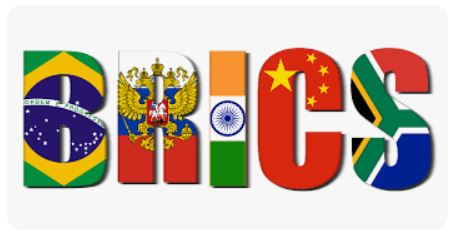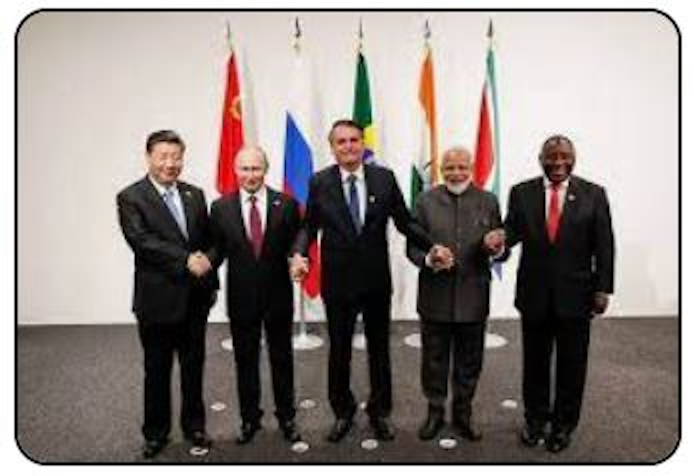
BRICS
By Karen Schumacher
As the Israeli and Ukraine wars rage on, and protests by a minority receive inflated media attention, there is a more ominous story brewing that is not in the media spotlight.
BRICS is the acronym for Brazil, Russia, India, China, and South America. Goldman Sachs first used the term BRIC in its Global Economics Paper in 2001. Russia, India, and China leaders met informally at the G8 Outreach Summit in 2006, with foreign ministers from these countries meeting formally at the United Nations General Assembly later in 2006. The first BRIC Summit was held in Russia in 2009 with South Africa joining in 2010, changing the name to BRICS. Supposedly, these countries gathered primarily for the purpose of creating an easier trade system between their countries. What should one think, knowing that major dictators like Vladimir Putin and Xi Jinping are part of a group leading an economic transformation opposite of the western world?

These countries have a “shared commitment to restructure the global political, economic, and financial architecture to be fair, balanced and representative, resting on the important pillars of multilateralism and international law.” The general feeling is that these “developing,” or Global South countries have always been left behind from the developed countries in economic matters. As far as the World Economic forum (WEF) is concerned, this is fine as “America’s dominance” will be over by 2030.
Traditional G7 “developed” countries are comprised of the U.S., UK, Germany, France, Japan, Italy, and Canada. However, BRICS does perceive itself as a “mechanism to counter the global influence of the G7″ and reduce the “dominance of the U.S. dollar in international trade and finance.” The fact that this group is comprised of significantly different cultures and political ideology makes advancement a little difficult, and that pesky China poses a challenge. But as always with despots, the greed of money and more power can glue them together. Indeed, China is urging that “more countries join…to make global governance more fair and reasonable.”
Formidable advances have been made by this group, in 2020 “BRICS (31.4 per cent) overtook the G7 (30 per cent)” in GDP with China and India in the lead. Perhaps the new “Global South” will be the new dominant force for the new world order.
Argentina, Egypt, Iran, Ethiopia, Saudi Arabia, and the United Arab Emirates (UAE) will join BRICS in 2024 with other prospective members in the future. This “expansion signifies an important move in the attempt to reshape the global order into a multipolar world, with voices from the Global South at the center of the international agenda.”
With Saudi Arabia and the UAE, BRICS will have “more influence over global energy supplies” giving the group production “over 42 percent of global oil supplies and 37 percent of the world’s gas.”
In 2014 BRICS established its own bank, The New Development Bank, which expanded to include Bangladesh, UAE, and Egypt. Its focus is projects that support a full blown implementation of sustainable development goals (SDG). China is generally considered to be the leader of BRICS, is calling for more expansion, and urging “members to let more countries join…to make global governance more fair and reasonable.”
BRICS has also given consideration to developing its own currency, one way being similar to what the European Union did with the euro. Its existence has also contributed to the de-dollarization that has been occurring. There have also been talks about developing a digital currency.
One could view this as a buildup of economic power rather than the traditional build up of armament and troops. With the addition of the other countries in 2024, BRICS will have almost half the world’s population (47%), will produce a third of GDP (37%), and possess “the lion’s share of the world’s oil and gas reserves, as well as a huge endowment of other natural resources.” How much possible economic damage could BRICS cause the rest of the world with these statistics? As usual, there are those who downplay the significance of BRICS, and there are multiple varying opinions from armchair experts.
However, the United Nations (UN) is certainly in support of BRICS for a “multipolar” world “based on the UN Charter and international law.” In the BRICS Declaration, it avows the “central role of the United Nations in the international system” (#13), and its full support of Agenda 2030 (#35). It also wants a reform of the Bretton Woods institutions, institutions that have been in place since WWII.
In its most recent meeting, held in August, 2023, BRICS created its new Declaration II, with an overall, general, endorsement of the UN. The document itself sounds like a conglomerate of countries joining hands for Agenda 2030, the EU having already adopted it. The U.S. is surrounded by a world of sustainable development. Folks, this transformation of the world is really closer than you may think.
What is the U.S. government response to BRICS? “”Participating in BRICS is a sovereign decision for member countries.” Interestingly, the U.S. State Department reported “When it comes to the BRICS, we’re deeply engaged with its leading members.” Engaged about what? With the U.S. pointing fingers at Iran as being a backer of terrorism, how will Iran fit into the BRICS Counterterrorism Working Group?
Demands from this group are not limited to economic concerns. It also wants more representation in leadership positions through the World Bank and International Monetary Fund (IMF), “comprehensive reform” of the UN which Beijing regards as central to global governance,” and increased representation by developing countries in the United Nations Security Council.
One theory about BRICS is that it is part of an intentional collapse of the economic system in order to create a one world economic system, and bring in a digital system that would in turn force everyone into the digital world.
What can Idaho do to thwart this threat? The simpleton solution seems to be the creation of its own economic power. Maybe create its own state bank, placing more emphasis on gold and silver as legal tender for a shield, investing more into Idaho resources that can be used to support the state, and reducing dependence on federal dollars. In other words, can Idaho stay out of the global economy as much as possible? After all, BRICS sees what they are doing as an economic protection from sanctions, why can’t Idaho do the same by protecting itself from outside economic forces?
In 2015, the world was forewarned about this by Christiana Figueres. “…we are setting ourselves the task of intentionally, within a defined period of time, to change the economic development model that has been reigning for at least 150 years…”
There are many economically savvy individuals in Idaho, some of whom have written about the way in which Idaho should shift its economic future. Those opinions would be welcome on this subject.